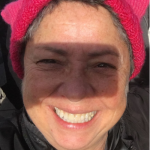Adapting to Online Teaching

An Interview with Sister Fred, Professor of French and Francophone Studies in the Department of Languages, Literatures, and Culture
How has your work changed, adapted, and shifted in this virtual world?
Let me put it this way: it’s not been easy but it’s been deeply enriching. At first, I was in full resistance to the whole idea. Back in Winter 2010, when we started hearing about the Covid-19 pandemic, I was adamant that no one could teach a foreign language online… and I am happy to admit that I was completely wrong! The most difficult thing for me was to learn how to use Canvas, which I deeply hated from the start – I am being perfectly honest, right!? After attending numerous workshops and requesting pointed support, I finally came around and began to appreciate how Canvas could be of support to me; however, I will say that it was a learning curve that spanned over several months. People of my generation – I was born in the late fifties – were certainly not brought up with the technology that younger generations – among whom our own students – can simply take for granted, today. We have had to learn how to use it to our advantage, and it is difficult to have to let go of the ways in which we have learned to learn without technology! My best asset, however, has been to be able to quickly learn to use Zoom and the break-out rooms. Once, I was in the virtual classroom, I felt back at home because – for the most part – I could see and interact with my students. I found new ways of building community with my students – as well as with DU staff & faculty –, and that felt exceedingly good. I almost made sure to make myself available to my students in as many ways as possible: via email, via Zoom, via text, and conventional phone calls.
What ways are you and your department/team are trying to build community, connections, and a deeper sense of belonging virtually?
Our distinguished chair of the Department of Languages, Literatures, & Cultures, Rachel Walsh, managed to bring together a staff team versed in technology, that completely revamped our Portfolio Community by giving all of us easy access to all the information we need. Of course, all of our meetings were held online; they were usually no more than 60, at times 90, minutes long, and always very well prepared & conducted. That helped tremendously and I am very grateful to our chair and staff members, Greg Storch and Claudia Vega Norell, for their support.
What are some of the biggest successes you’ve seen as the world has shifted to a virtual experience?
I believe that the biggest successes have been at the level of accessibility to many more DU community-based events taking place online; I was able to participate in a number of debates, webinars, Community + Values, and DEI events online because I did not have to drive anywhere or walk over to the correct venue. The same was true for international conferences and meetings in my field of research. So, the virtual flexibility to attend many events, anywhere, at just about any time, was tremendous.
What are some of the biggest challenges you’ve seen as the world has shifted to a virtual experience?
With great success comes the greatest challenge of all: time and stamina! Constant online connections are simply exhausting physically and mentally. It takes a lot of courage and self-dedication to stay away from the computer screen to give your mind and your body a chance to rest and recharge. Not to mention fighting the feeling of depression that we have all felt at not being able to get out of the house easily, meet friends & family, share meals in restaurants, etc.
If you could say one thing to the DU Community right now, what would you say?
Hang in there, friends and colleagues, there is light at the end of the COVID-19 tunnel and we will be so happy to all be on campus again, that we will live our community life to the fullest… and as never before!!!
To learn more about The Languages, Literatures, & Cultures, visit: https://liberalarts.du.edu/languages